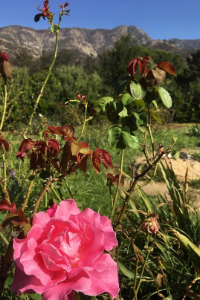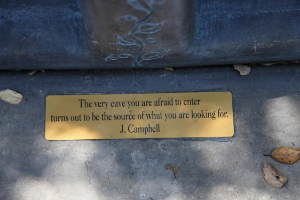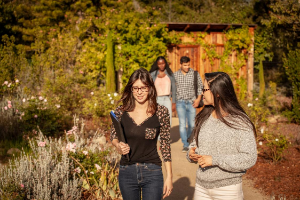
Curandera and storyteller, Clarissa Pinkola Estes, speaks of depth psychology as a way to “the river beneath the river,” to a place that delves deeper than the surface of things into implicit and nonlinear knowing and broadens the subtle field of intersubjectivity, integrating systems of being. Integratio may be fostered by a restoration of “beginner’s mind” to renew a sense of wonder, openness, feeling, and curiosity.
Perhaps you are aware of something that drives you, breathes you, that has brought you here to inquire about our integrative program and to do so now in this intense time of global uncertainty, paradox, and possibility?
What is speaking to you and through you? Why DPT now?
We honor the many ways of knowing and relationship in a transdisciplinary and multicultural mosaic to prepare students for a uniquely personal path to professional work in depth-oriented therapeutic contexts. We may imagine the healing arts, including but not limited to psychotherapy, as the most genuine of alchemical arts in a world aching for authenticity, attuned embodiment, solidarity and advocacy, cultural curiosity, mindful engagement, and turning a face toward the wisdom of dreams.
Our age is cluttered with the literal and representational, the binary and categorical, either romanticizing the mystery of embodiment or rationalizing it into deadness. Therapy and the healing arts invite creativity and compassion for the purposes of individuation and integration, which open to feeling and to the awe of the sacred.
What are you called to in these times? How may we each serve life in the face of climate change, pandemics, systemic oppression, and the continuously expanding world of cyberspace? Denial and projection have never been solutions to the variety of human sufferings. Many of us experience the emotional, physical, and spiritual repercussions of living a false life and turn away from compassionate service. Depth Psychology with an Emphasis in Integrative Therapy and Healing Practices (DPT) is a program that is well positioned philosophically and creatively to imagine ways to address trauma and the technical and sociopolitical impacts on soul.
Our program blends ancient and indigenous traditions with their models of collective care and community wellness, along with profound therapeutic approaches from Jungian and Post-Jungian pioneers. Our integrative focus exemplifies the embodiment of wisdom and care for all sentient beings as we focus on equity and inclusion. Embracing the notion of “therapeutic sensibility,” we look for compassion, curiosity, critical thinking, relationality, and ethical character above all else in our candidates for admission to the program. We long to listen to often unheard voices of those marginalized, violated, and dismissed, including the earth itself - a living and conscious entity worthy of empathy, relationality, and commitment. We inquire with our students about what it means to be a psychotherapist or one who reaches out into community in healing contexts and transformative ways.
Serving a compensatory function, the creative and integrative process in the healing arts are needed to mend the violence and privileged dominance of colonialism and the ways in which we have embodied such. Jung (1954) has articulated this insightfully, in his usual way, with : “In this lies the social significance of art: it labors without cease to educate the spirit of the age, bringing to birth those forms in which the age is most lacking” (Jung, as cited in Neumann, 1954, p. 376). In The Red Book, he reflects on how the “spirit of the depths” is like watering a dry desert garden with feeling and surrender and being witness to the flowering that emerges. In the DPT program we nurture the capacity to witness well, listen deeply even to silence and somatic expressions, and accompany others through their individuation journey by acknowledging the resonant symbols of various cultures and traditions and honoring spiritual, environmental, sexual, gender, and healing orientations and temperament preferences.
The realms of feelings, intuitions, earth-based knowledge, myth, symbol, the subtle body, complexity and emergence, the sacred, and interior visions have been devalued in strictly materialist paradigms. Jung contrasts this bias toward the literal, saying:
“The spirit of the depths even taught me to consider my action and my decision as dependent on dreams. Dreams pave the way for life, and they determine you without you understanding their language. One would like to learn this language, but who can teach and learn it? Scholarliness alone is not enough; there is a knowledge of the heart that gives deeper insight. The knowledge of the heart is in no book and is not to be found in the mouth of any teacher, but grows out of you like the green seed from the dark earth.”
 However, we can lose touch with this fertile green seed, mostly through the interpersonal wounds we inflict on each other and on this planet. Our program focuses on coming back to remembrance. We can suffer profound wounds by a lack of remembrance of how to cool the hot and scattered noise in our lives, in our immune systems, our minds, in our shared world. Our integration of ecotherapeutic and ancient approaches from the world’s traditions provides education and experience around the value of, for instance, walking barefoot on the earth or putting one’s hands into mud, where we know that inflammation in its literal and figurative contexts begins to be cooled by the reciprocal interaction. Those who have never left indigenous traditions know this well and we all know it somewhere on a cellular and ancestral level.
However, we can lose touch with this fertile green seed, mostly through the interpersonal wounds we inflict on each other and on this planet. Our program focuses on coming back to remembrance. We can suffer profound wounds by a lack of remembrance of how to cool the hot and scattered noise in our lives, in our immune systems, our minds, in our shared world. Our integration of ecotherapeutic and ancient approaches from the world’s traditions provides education and experience around the value of, for instance, walking barefoot on the earth or putting one’s hands into mud, where we know that inflammation in its literal and figurative contexts begins to be cooled by the reciprocal interaction. Those who have never left indigenous traditions know this well and we all know it somewhere on a cellular and ancestral level.
Our dreams and waking dreams will lead the way to integrating trauma, supporting our relationship to our bodies, and blossoming creativity, that is if we listen to them and interactively work with them through active imagination and relationality. Many of you, of course, are already doing much of this and come here to deepen your learning and experience in the alchemical nature of such work in your service to others and many of you know trauma deeply, from your own experiences of solastalgia, or cultural and other kinds of oppression, loss, and interpersonal wounding.
Amplifying the value of service through the therapeutic and healing arts, Malidoma Somè reminds us that, “We carry something transformative inside ourselves and we are coming here to give it to someone.” We are “linked through this invisible thread” with the ancestors and “they want us to employ them, to give them a job.” Our courses in the DPT program and our faculty invite facilitation into a deep awareness that, through our actions, we may begin to weave in the mendings of intergenerational wounds while not forgetting the contextual nuances of personal and collective narratives. For instance, in her book, Archetypal Grief: Slavery’s Legacy of Intergenerational Child Loss, our core faculty member, Dr. Fanny Brewster poses the question: “What of the integrative spiritual practices of African Americans? What form do they take? How might they evolve archetypally?” (p. 130.
In our integrative program, we embrace the notion that a wound, through tilling the soil with embodied inquiry, may become a generative and flowering tree of creative expression, contemplative, symbolic living and life passages, embodied wellness, and social engagement. Symptoms are guides to be in relationship with. By being in relationship with suffering and projections rather than in their grips, we trust in the paradoxical and impermanent nature of things. We find meaning that invigorates us. When this is extended toward interactions with others and into community, we may surprise ourselves by finding that we are more able to act with fortitude for human rights, justice, and care in our own unique way, while not getting caught up in the eye for an eye provocation of revenge, nor collapsing into passivity or dissociating. We may recognize synchronicities. As we know, our work with others begins with ourselves. Our small clusters of practice consultation groups build upon this notion, supporting and fostering your unique therapeutic gifts.

This is a doctoral program, so it is not easy. One must rise to the occasion of scholarly work and move through what I like to refer to as the initiatory rings of fire, like dissertation completion.
We have certainly had some other types of initiations in these past couple of years, from fires and mudslides to a pandemic. COVID-19 has led us to deliver our courses in an online format which started at the end of winter 2020 will be continuing throughout 2020. This leads us to consider how, in the future, we may imagine ways to adjust to the times and to make our program more accessible for even those with physical or medical restrictions or who may wish to attend from international venues.
Our esteemed core faculty are doing some interesting things. Jungian Analyst, Dr. Fanny Brewster, writes about the cultural and racial complex and the African American experience. Her most recent book, The Racial Complex is featured in Routledge Publications recommended reading list. Dr. Elizabeth Nelson explores our somatic relationship to the cyborg and guides you through the scholarly research process. Jungian Analyst, Dr. Lionel Corbett has delved deeply into the question of the psyche and the sacred, among other intriguing topics such as shadow aspects of collective life. Jungian Analyst, Dr. Pat Katsky looks forward to having you in her course on the inner landscape of dreams and active imagination. She is also writing on the meaning of enlightenment. My most recent work is a chapter in the book, Humanistic Approaches to Multiculturalism and Diversity and I and continue to be fascinated by how the subtle field interacts with healing.
Dr. Evergreen Herricks, our wonderful Program Administrator, is one of the founders of a group that gathers every year to create street mandala art in Ojai. When you come to campus, you will see her playful tree art as well. Her more administrative side will assist you with academic planning and other logistical aspects of your doctoral program.
Our adjunct faculty are engaging in fascinating projects as well. Look at the faculty section of our DPT page and you will see the all the things that our faculty members are up to.
We engage in ritual around important moments, such as orientation to the program, holidays, or when students complete all their coursework and move into doctoral candidacy. Chumash elder, Art Cisneros, leads us and accompanies us in ceremony and co-leads one of our morning check-in groups. Sometimes a student will have an idea, such as the one our student, Heesun Kim had, when she created a weekend of private contemplative and group ritual around the “Grieving Tree” experience, after having noted that several cohort members had lost loved ones. (See link from our Pacifica blog). Our first-year cohort has engaged in sharing circles together and they have now continued this online during this time of COVID-19, bringing some of their creative work into the mix. Students have begun a student-led support group through the Diversity and Inclusion Council.
Our guest speakers bring a variety of topics to us. Most recently, we have Mexican Curandera, Veronica Iglesias, doing a two-part webinar for our DPT students on 1) TICIYOTL the Mesoamerican Medicinal Arts, specifically in working with addiction, and 2) Malinalxochitl and the wisdom of the Universe.
 Come walk the labyrinth with us (for now, virtually, and metaphorically), immerse yourself in scholarly and experiential study, join a cohort and faculty of like-minded scholars and practitioners, and follow your dreams. Your dreams will tell you if this is the path of specialization for you. I look forward to meeting you should you decide to apply to our special doctoral program.
Come walk the labyrinth with us (for now, virtually, and metaphorically), immerse yourself in scholarly and experiential study, join a cohort and faculty of like-minded scholars and practitioners, and follow your dreams. Your dreams will tell you if this is the path of specialization for you. I look forward to meeting you should you decide to apply to our special doctoral program.
We are still accepting applications for this Fall. Apply online today!



